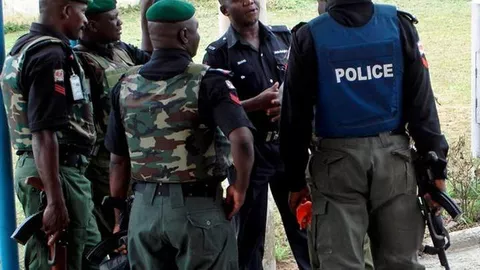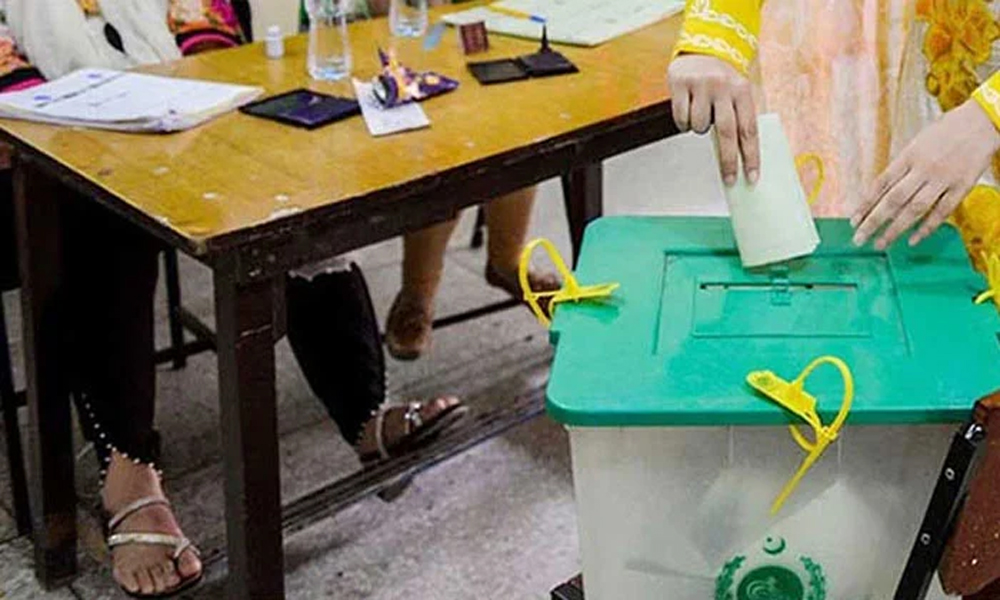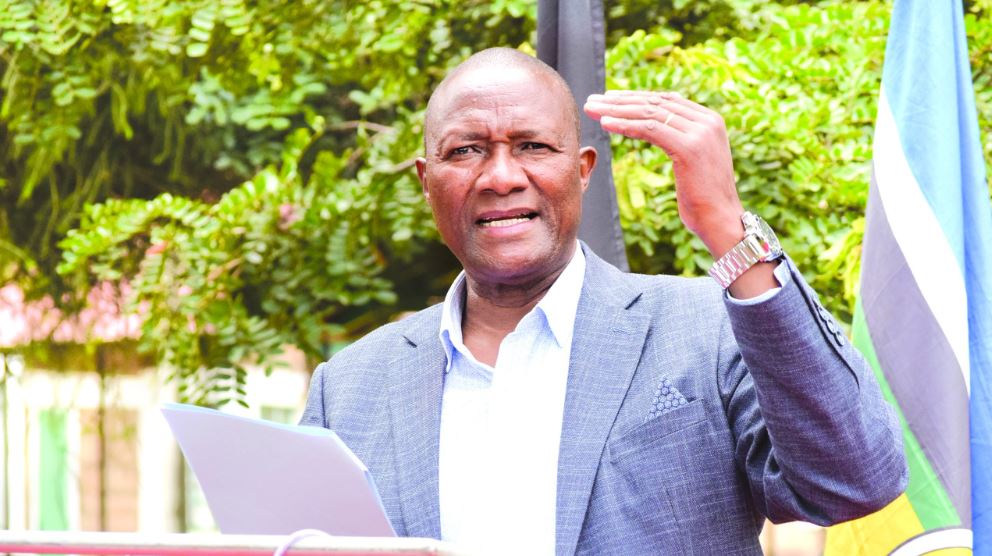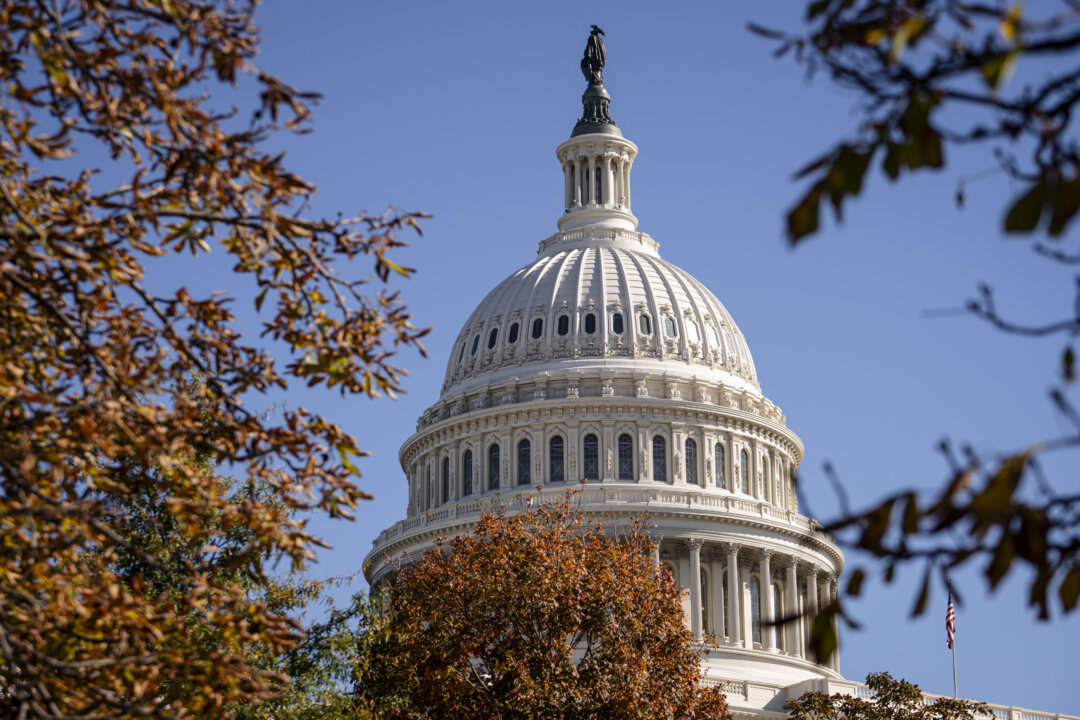
WASHINGTON — American voters are approaching the presidential election with deep unease about what could follow, including the potential for political violence, attempts to overturn the election results and its broader implications for democracy, according to a new poll. The findings of the survey, conducted by The Associated Press-NORC Center for Public Affairs Research, speak to persistent concerns about the fragility of the world's oldest democracy, nearly four years after former President Donald Trump's refusal to accept the 2020 election results inspired a mob of his supporters to storm the U.S.
Capitol in a violent attempt to stop the peaceful transfer of power. About 4 in 10 registered voters say they are "extremely" or "very" concerned about violent attempts to overturn the results after the November election. A similar share is worried about legal efforts to do so.
And about 1 in 3 voters say they are "extremely" or "very" concerned about attempts by local or state election officials to stop the results from being finalized. Relatively few voters — about one-third or less — are "not very" or "not at all" concerned about any of that happening. Trump has continued to lie about fraud costing him reelection four years ago and is again forecasting that he can lose this time only if the election is rigged against him, a strategy he deployed since his first run for office.
His allies and the Republican National Committee, which he reshaped, filed lawsuits around the country that are a potential prelude to post-election legal challenges should he lose. "I thought after Jan. 6 of 2021, the GOP would have the sense to reject him as a candidate," Aostara Kaye, of Downey, California, said of Trump.
"And since they didn't, I think it just emboldened him to think he can do anything, and they will still stick with him." Vice President Kamala Harris speaks Saturday during a campaign rally at the Wings Event Center in Kalamazoo, Mich. Trump's wide-ranging attempts to reject the will of the voters and remain in power after his 2020 loss led to concerns that he will again fail to concede should he lose to Vice President Kamala Harris.
Nearly 9 in 10 voters said the loser of the presidential election is obligated to concede once every state has finished counting its votes and legal challenges are resolved, including about 8 in 10 Republicans. But only about one-third of voters expect Trump to accept the results and concede if he loses. Democrats and Republicans have widely divergent views on the matter: About two-thirds of Republican voters think Trump would concede, compared to only about 1 in 10 Democrats.
The same concern does not apply to Harris. Nearly 8 in 10 voters said Harris will accept the results and concede if she loses the election, including a solid majority of Republican voters. Former President Donald Trump dances Saturday at a campaign rally at the Bryce Jordan Center in State College, Pa.
Members of both parties have broad concerns about how American democracy might fare depending on the outcome of the November election. Overall, about half of voters believe Trump would weaken democracy in the U.S.
"a lot" or "somewhat" if he wins, while about 4 in 10 said the same of Harris. Not surprisingly, Americans were deeply divided along ideological lines. About 8 in 10 Republicans said another term for Trump would strengthen democracy "a lot" or "somewhat," while a similar share of Democrats said the same of a Harris presidency.
About 9 in 10 voters in each party said the opposing party's candidate would be likely to weaken democracy at least "somewhat" if elected. Kaye, a retired health care system worker, called Trump an "existential threat to the Constitution." One prospect she said frightens her is that if Trump wins, he likely will not have the guardrails in his new administration that were in place in the last one.
Republican voter Debra Apodaca, 60, from Tucson, Arizona, said it's Harris who is a greater threat to democracy. She said President Joe Biden's administration has placed too great a priority on foreign aid and shown a lack of concern for its own people. "Our tax dollars, we're just sending it everywhere.
It's not staying here. Why aren't we taking care of America?" she said. "Why should we pay taxes if we're just sending it away?" Rioters loyal to President Donald Trump storm the Capitol on Jan.
6, 2021, in Washington. Part of what divides voters on their views of American democracy is the Jan. 6 attack on the U.
S. Capitol and who is to blame. Democrats and independents are much more likely than Republican voters to place "a great deal" or "quite a bit" of responsibility on Trump.
Susan Ohde, an independent voter from Chicago and a retiree from the financial sector, said she's concerned that "crazy people will buy the misinformation that they're given," leading to another such attack. Views about the Jan. 6 attack are not the only ones where voters split along ideological lines.
Following Trump's lead, a majority of Republicans maintain that Biden was not legitimately elected. Nearly all Democrats and about 7 in 10 independents believe Biden was legitimately elected. Rioters scale a wall at the U.
S. Capitol on Jan. 6, 2021, in Washington.
(AP Photo/Jose Luis Magana) Supporters loyal to then-President Donald Trump attend a rally on the Ellipse near the White House on Jan. 6, 2021, in Washington. (AP Photo/Julio Cortez) Trump supporters participate in a rally in Washington on Jan.
6, 2021. (AP Photo/John Minchillo) Trump supporters participate in a rally Jan. 6, 2021, in Washington.
(AP Photo/John Minchillo) Then-President Donald Trump gestures as he arrives to speak at a rally in Washington, on Jan. 6, 2021. (AP Photo/Jacquelyn Martin) People listen as then-President Donald Trump speaks during a rally Jan.
6, 2021, in Washington. (AP Photo/Evan Vucci) Supporters of then-President Donald Trump try to break through a police barrier at the Capitol in Washington on Jan. 6, 2021.
(AP Photo/Julio Cortez) A supporter of then-President Donald Trump is injured during clashes with police at the U.S. Capitol, Jan.
6, 2021, in Washington. (AP Photo/Julio Cortez) A rioter pours water on herself at the U.S.
Capitol on Jan. 6, 2021, in Washington. (AP Photo/Jose Luis Magana) A Trump supporter holds a Bible as he gathers with others outside the Capitol, Jan.
6, 2021, in Washington. (AP Photo/John Minchillo) Trump supporters try to break through a police barrier, Wednesday, Jan. 6, 2021, at the Capitol in Washington.
(AP Photo/John Minchillo) A demonstrator supporting then-President Donald Trump, is sprayed by police, Jan. 6, 2021, during a day of rioting at the Capitol.(AP Photo/John Minchillo) Rioters try to enter the U.
S. Capitol on Jan. 6, 2021, in Washington.
(AP Photo/John Minchillo) U.S. Capitol Police try to hold back rioters outside the east doors to the House side of the U.
S. Capitol, Jan 6, 2021. (AP Photo/Andrew Harnik) Rioters gather outside the U.
S. Capitol in Washington, on Jan 6, 2021. (AP Photo/Andrew Harnik) Protesters gather outside the U.
S. Capitol, Jan 6, 2021. (AP Photo/Andrew Harnik) Jacob Anthony Chansley, center, with other insurrectionists who supported then-President Donald Trump, are confronted by U.
S. Capitol Police in the hallway outside of the Senate chamber in the Capitol, Jan. 6, 2021, in Washington.
Chansley, was among the first group of insurrectionists who entered the hallway outside the Senate chamber. (AP Photo/Manuel Balce Ceneta) U.S.
Capitol Police hold rioters at gun-point near the House Chamber inside the U.S. Capitol on Jan.
6, 2021, in Washington. (AP Photo/Andrew Harnik) Lawmakers evacuate the floor as rioters try to break into the House Chamber at the U.S.
Capitol on Jan. 6, 2021, in Washington. (AP Photo/J.
Scott Applewhite) Police with guns drawn watch as rioters try to break into the House Chamber at the U.S. Capitol on Jan.
6, 2021, in Washington. (AP Photo/J. Scott Applewhite) Congressmen shelter in the House gallery as rioters try to break into the House Chamber at the U.
S. Capitol on Jan. 6, 2021, in Washington.
(AP Photo/Andrew Harnik) Members of Congress wear emergency gas masks as they are evacuated from the House gallery as rioters try to break into the House Chamber at the U.S. Capitol on Jan.
6, 2021, in Washington. (AP Photo/Andrew Harnik) The House gallery is empty after it was evacuated as rioters try to break into the House Chamber at the U.S.
Capitol on Jan. 6, 2021, in Washington. (AP Photo/J.
Scott Applewhite) Rep. Andy Kim, D-N.J.
, cleans up debris and personal belongings strewn across the floor of the Rotunda in the early morning hours of Jan. 7, 2021, after rioters stormed the Capitol in Washington. (AP Photo/Andrew Harnik) Members of the DC National Guard surround the U.
S. Capitol on Jan. 6, 2021, in Washington.
(AP Photo/Julio Cortez) Vice President Mike Pence and Speaker of the House Nancy Pelosi, D-Calif., read the final certification of Electoral College votes cast in November's presidential election during a joint session of Congress after working through the night, at the Capitol in Washington, Jan. 7, 2021.
(AP Photo/J. Scott Applewhite, Pool) A flag hangs between broken windows after then-President Donald Trump supporters tried to break through police barriers outside the U.S.
Capitol, Jan 6, 2021. (AP Photo/John Minchillo) A flag that reads "Treason" is visible on the ground in the early morning hours of Jan. 7, 2021, after rioters stormed the Capitol in Washington.
(AP Photo/Andrew Harnik) An ATF police officer cleans up debris and personal belongings strewn across the floor of the Rotunda in the early morning hours of Jan. 7, 2021, after rioters stormed the Capitol in Washington. (AP Photo/Andrew Harnik) Stay up-to-date on the latest in local and national government and political topics with our newsletter.
.













